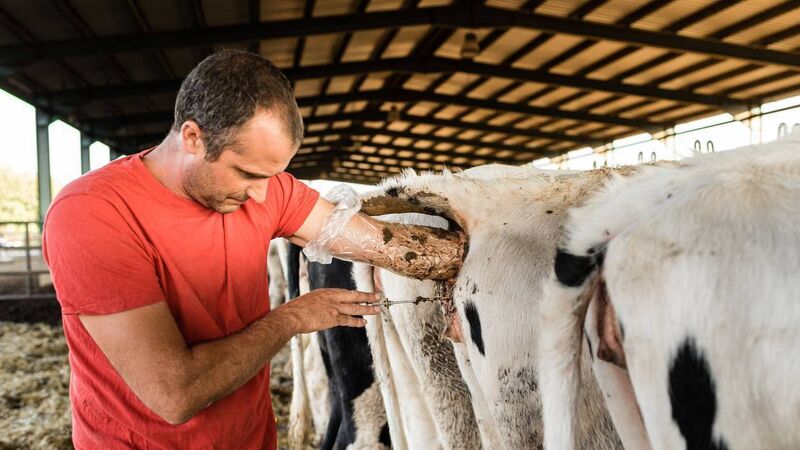Herd health MOT: Get 2023 breeding off on the right hoof

Minerals play a vital role in the resumption of cyclicity and a successful breeding season.
The end of April and start of May has traditionally been the start of the breeding season for herds across the country.
In recent years, many clients have told me that they now find breeding more stressful than calving, as one missed heat has huge financial implications for the year ahead.
The backbone of any successful dairy business is getting the cows back in calf. But what does good fertility really mean?
In its mathematical form, pregnancy rate is equal to the submission rate multiplied by the conception rate.
In simple terms, fertility refers to the equation above. Where cows are not scanned in-calf, this usually indicates a fertility issue. To solve these issues, we need to take a closer look at the numbers as to why this has happened.
Even small changes can yield results. For example, if we are disappointed with 15% of cows not in calf in a 100-cow herd, by simply getting a further five cows in calf, we can get this rate below 10%. An ideal target for cows is to have an empty rate of less than 10%.
There are four key areas to focus on this breeding season, which we will look into in more detail:
- Mating start date;
- Diet consistency;
- Body condition score;
- Mineral nutrition.
The decision of when to start breeding depends on when you want your cows to calve next spring.
A breeding start date should be based on matching grass and feed supplies on your own farm. If your farm has an early turnout date to grass in a spring calving system, the breeding start date needs to match this.
On some farms, three weeks of pre-breeding checks are completed with the hope of picking out non-cycling cows that may require treatment ahead of breeding.
Often it is the case that a non-cycling cow had a metabolic issue around calving time such as a hard calving, milk fever, metritis or retained cleaning. Another issue which can be picked up at a pre-breeding check are silent-heat cows which show no sign of bulling at all.
If a cow does not show signs of bulling post 42 days calved, then she needs to be examined and treated by your vet.
Diet formulation and advice around breeding season needs to be considered carefully during breeding season.
The demands of the cows are pushed, as they are often in peak milk yield during the breeding season. As a result, for breeding to be successful, cows need to be on a rising plane of nutrition.
Due to high grass growth during the breeding window, cows traditionally are out day and night on grass, with very little meal being fed through the parlour.
For the duration of the breeding season, put the cow’s needs first, with grass taking a backseat just for a few weeks. Utilising as much grass as possible is vital for grass quality, but meeting the cow’s dry matter intake is priority number one.
A lactating cow can eat 3.5% of her body weight in dry matter daily. A 580kg cow can eat 20kg DM daily if offered to her.
Aim to provide an energy-dense diet throughout the entire breeding season. A cow grazing will typically be offered 16–17kg DM of grass daily.
If their requirement is 20kg DM, then this energy gap must be filled with concentrates. Feed 3–4kg of concentrate of a high-energy meal with 14–15% crude protein throughout the breeding season.
If your cows have a higher milk output, they will also have a higher dry matter intake demand. In situations with higher-yielding cows, a buffer feed with higher levels of concentrate and forages such as maize silage may be the best option to meet their energy demands, along with grazed grass as the primary feed.
There’s no harm in testing your grass to see what energy and crude protein is available. This will give you an idea of the type of meal required during the breeding season.
Cows throughout breeding season need to be at a minimum body condition score of 2.75–3.0. Cows which are milking off their back and in a poor BCS of less than 2.5 will struggle to go in calf, as they do not have enough energy to maintain a pregnancy.
Monitor body condition closely post-calving, as cows which are not supplied with adequate amounts of energy will lose excess weight, leading to a drop in BCS. Cows need to be scored regularly in a crush throughout the year to monitor BCS.
Trying to put condition on cows during the breeding season is like pushing water up a hill; it’s only going to go one way.
Aim to have your work done ahead of the breeding season by putting an emphasis on high-energy diets and holding back protein in feeds.
The wet weather and rehousing of cows at the beginning of April can have an effect, with some herds losing significant condition due to a lack of energy in the cow’s diet.
Minerals play a vital role in the resumption of cyclicity and a successful breeding season.
Throughout the breeding season, we need a healthy immune system that helps display a strong heat for cows.
Deficiencies in certain trace minerals can lead to infertility if not dealt with early.
Anoestrous behaviour and silent heats in the herd, for instance, are often linked to deficiencies in copper and manganese.
It is crucial to have a certain amount of selected minerals supplied to the cows during breeding season.
As you choose your mineral supplements, be mindful that organic minerals are a better choice than inorganics because they are more bioavailable for absorption by the cow and have fewer interactions with antagonists.
For example, organic selenium, such as that supplied by Sel-Plex®, has been shown to help improve the cow’s immunity overall.
Ensuring that levels of organic selenium are at the correct levels has been shown to significantly reduce incidences of metritis and services per conception.
Copper also plays a vital role in improving herd fertility, so you should use an organic form, such as that contained in Bioplex®, throughout the breeding season. In one study, cows fed with Bioplex also calved 42 days earlier and produced an extra 170 litres of milk in the first 100 days of the lactation.
Overall, it is important to remember that healthy immune systems in your cows are vital to a successful breeding season for your herd.
Minerals on their own are not a secret ingredient that solves all fertility issues, but to achieve the results you want this breeding season, it is worth paying attention to the amounts and types of minerals being offered to your animals.


